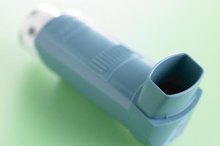The Best Seasonal Allergy Medications
Seasonal allergic rhinitis, also known as hay fever, is usually caused by outdoor allergens, such as pollen that are inhaled. The best treatment for seasonal allergies is to avoid exposure to the allergens. However, many medications can help reduce the symptoms of sneezing, stuffy and runny nose and itchy eyes.
If you are experiencing serious medical symptoms, seek emergency treatment immediately.
Nasal Sprays: Prescription
Nasal sprays are often recommended first by allergy doctors because they directly target the problem areas (nose and sinuses) of allergy sufferers. Some contain corticosteroids (a steroid hormone produced by the body that reduces inflammation and decreases the body’s immune response) and require a prescription. It takes a few days to a week after use for the sprays to take effect. Try to keep track of when your symptoms start each season and start the sprays a few weeks beforehand.
The most popular sprays are Flonase (fluticasone), Nasonex (mometasone), Beconase (beclomethasone), Nasacort (triacinolone) and Atrovert (ipratropium bromide).
- Nasal sprays are often recommended first by allergy doctors because they directly target the problem areas (nose and sinuses) of allergy sufferers.
Nasal Sprays: Over-the-Counter
The Best Allergy Medicine for High Blood Pressure
Learn More
Nasalcrom (cromolyn sodium) helps relieve nasal symptoms by preventing the release of histamine. Like the other nasal sprays, it should be taken before the onset of symptoms, if possible.
Oral Antihistamines
Oral antihistamines are available as both prescription medication or over-the-counter. Oral antihistamines are not as desirable as nasal sprays because they can have side-effects such as drowsiness or they can impact people’s moods.
Oral antihistamines include Actifed (a combination antihistamine and decongestant); Benadryl (diphenhydramine); Claritin and Alavert (loratadine), Chlor-Trimeton (chlorpheniramine); Tavist (clemastine), Allegra (fexofenadine) and Zyrtec (cetrizine).
Decongestants
Antihistamines for Asthma
Learn More
Decongestants shrink swelling and reduce blood flow to body areas affected by allergies. They come in various forms: tablets, liquids, nasal sprays and drops, and eye drops. They can be used in combination with antihistamines to help handle severe symptoms, but are less desirable than nasal corticosteroid sprays, antihistamine nasal sprays or oral antihistamines because they can raise blood pressure and cause heart palpitations or rebound congestion (swelling of nasal passages) if used long-term. Unless instructed by your doctor, avoid using nasal decongestants for more than three days in a row.
Popular decongestants include Sudafed (pseudoephedrine), Actifed (a combination antihistamine and decongestant), Afrin (Oxymetazoline hydrochloride) and Neo-Synephrine (Phenylephrine).
Purchase of decongestants containing pseudoephedrine requires showing an identification card at the pharmacy in an effort by the government to curb its use in the production of crystal meth (methamphetamine). Like with meth use long-term use of Sudafed can cause paranoia.
- Decongestants shrink swelling and reduce blood flow to body areas affected by allergies.
- They can be used in combination with antihistamines to help handle severe symptoms, but are less desirable than nasal corticosteroid sprays, antihistamine nasal sprays or oral antihistamines because they can raise blood pressure and cause heart palpitations or rebound congestion (swelling of nasal passages) if used long-term.
Leukotrine Modifiers
Singulair and Accolate (zafirlukast) are two examples of leukotrine modifiers. They block the body’s production of leukotreines, which are inflammatory chemicals.
Herbs
The only herb shown to be effective through scientific studies in treating seasonal allergies in humans is butterbur (Petasites hybridus). It reduces mucus build-up and has diuretic effects. One study, published in the January 19, 2002 issue of the “British Medical Journal” by Andreas Schapowal showed that butterbur is as effective as Zyrtec in treating allergy symptoms 2. According to the University of Maryland Medical Center, another study showed butterbur to be as effective as Allegra 1. Because these studies are limited in scope, the Mayo Clinic advises pregnant and breastfeeding women and young children not to take butterbur until more research is completed.
Make sure to look for a product labeled “PA-free.” Butterbur contains a chemical that is potentially harmful to the liver, and PA-free products have had this chemical removed.
- The only herb shown to be effective through scientific studies in treating seasonal allergies in humans is butterbur (Petasites hybridus).
- Butterbur contains a chemical that is potentially harmful to the liver, and PA-free products have had this chemical removed.
Related Articles
References
- University of Maryland Medical Center
- Schapowal A; Petasites Study Group. Randomised controlled trial of butterbur and cetirizine for treating seasonal allergic rhinitis. British Medical Journal. 2002;324(7330):144-146.
- American Academy of Asthma Allergy and Immunology. Allergy and Asthma Medication Guide. https://www.aaaai.org/conditions-and-treatments/drug-guide/nasal-medication
- Meltzer EO, Blaiss MS, Derebery J, et al. Burden of Allergic Rhinitis: Results From the Pediatric Allergies in America Survey. J Allergy Clin Immunol. 2009; 124:S43-70. doi: 10.1016/j.jaci.2009.05.013
Resources
Writer Bio
Marie Zhuikov is an award-winning public relations professional who has been covering medical, environmental, fitness and travel topics since 1984. Zhuikov has a Master of Arts in health journalism from the University of Minnesota, and has produced a variety of products for the Mayo Clinic, Superior National Forest, and the Sea Grant Program.









